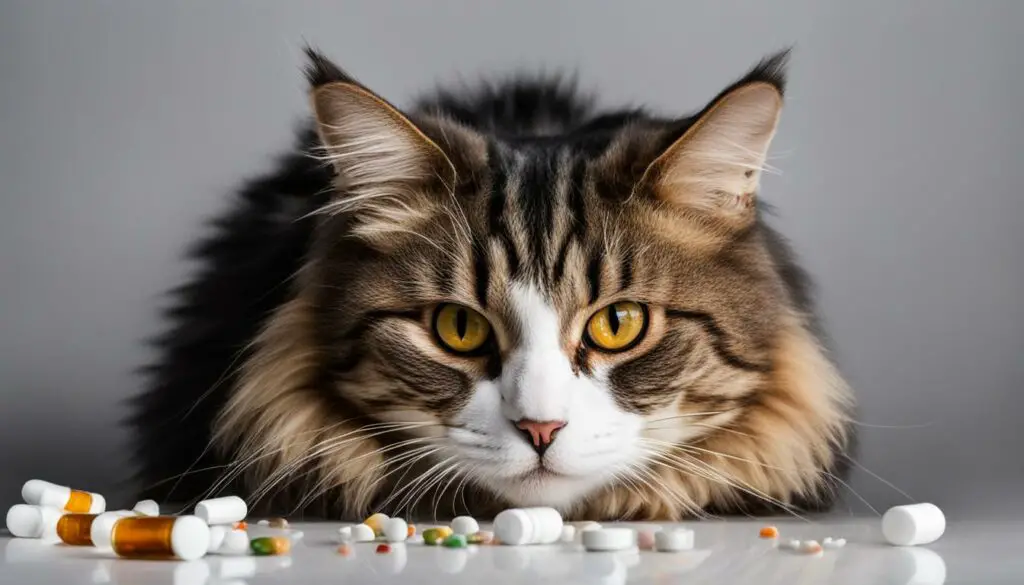Giving antibiotics to your cat can be a lifesaving measure when it comes to bacterial infections. However, it’s important to recognize that these medications can sometimes have side effects, including upset stomach and vomiting. If you’ve noticed your cat throwing up after antibiotics, it’s essential to understand why this may be happening.
Antibiotics are designed to target and kill bacteria, but they are not effective against viruses or fungi. Administering antibiotics to a cat with a viral or fungal infection can lead to adverse reactions, such as vomiting. It’s crucial to ensure that your cat actually has a bacterial infection before starting antibiotic treatment.
Proper dosage is another important factor to consider when it comes to your cat’s reaction to antibiotics. Veterinarians determine the appropriate dosage based on factors like the type of infection and your cat’s weight. It’s vital to follow the prescribed dosage and not share antibiotics between pets, as different animals may require different dosages. Giving the wrong dosage or stopping antibiotics too soon can result in ineffective treatment and antibiotic resistance.
Overprescribing antibiotics can be detrimental to your cat’s health. Not only can it lead to antibiotic resistance, but it can also cause vomiting and other adverse effects. It’s crucial to use antibiotics only when they are necessary and for bacterial infections specifically. If your cat is experiencing frequent infections, it may be indicative of an underlying issue that needs to be addressed, such as allergies.
Completing the full course of antibiotics is essential to ensure the effectiveness of treatment and prevent the recurrence of infections. Stopping antibiotics early can increase the risk of antibiotic resistance and allow the infection to come back. If your cat misses a dose, consulting with your veterinarian is crucial for guidance.
Allergic reactions to antibiotics can also be a reason for your cat throwing up after medication. If your cat experiences severe symptoms like difficulty breathing, hives, or seizures, seek immediate veterinary care. It’s important to inform your veterinarian about any other medications your cat is taking, as drug interactions can occur.
If your cat has an allergic reaction to antibiotics, your veterinarian may administer IV fluids to rehydrate your cat and flush the medication out of their system. They may also prescribe antihistamines to fight the allergic reaction. In some cases, your veterinarian may need to replace the antibiotic with an alternative.
Bathing your cat with a prescribed shampoo can help alleviate skin irritation caused by an allergic reaction. It’s important to follow your veterinarian’s instructions for proper bathing techniques to provide relief to your cat’s inflamed skin.
Once your cat has had an allergic reaction to a specific antibiotic, it’s advisable to avoid using that medication in the future. Your veterinarian may prescribe an alternative treatment if necessary. It’s crucial to follow their recommendations to prevent additional allergic reactions.
If your cat experiences a severe allergic reaction, your veterinarian may recommend close monitoring and potentially keeping them overnight for observation. This ensures their stability and response to treatment.
Communication with your veterinarian is essential if you notice any concerning symptoms or side effects after your cat has been prescribed antibiotics. They can provide guidance, adjust the treatment if necessary, and address any concerns you may have.
Proper medication administration is crucial to minimize the likelihood of vomiting. Following your veterinarian’s instructions on administering the medication and providing treats or rewards afterward can help create a positive association for your cat.
If your cat’s condition does not improve or worsens after a few days of antibiotic treatment, it’s important to contact your veterinarian for further evaluation. Severe symptoms like difficulty breathing or weakness require immediate veterinary attention.
Inform your veterinarian about any other medications your cat may be taking, as some medications can interact with antibiotics. This can either cause side effects or reduce the effectiveness of the treatment.
Key Takeaways:
- Vomiting after antibiotics can be a side effect of the medication.
- Antibiotics should only be given for bacterial infections, not viral or fungal infections.
- Proper dosage and completion of the full course of antibiotics are crucial for effective treatment.
- Overprescribing antibiotics can lead to antibiotic resistance and adverse reactions.
- Allergic reactions to antibiotics should be treated promptly and monitored closely.
How Antibiotics Work and Their Limitations
When it comes to treating bacterial infections in cats, antibiotics are often the go-to solution. However, it’s important to understand how antibiotics work and their limitations to ensure the best possible outcome for your feline companion.
A key point to remember is that antibiotics are specifically designed to target and kill bacteria, not viruses or fungi. Administering antibiotics to a cat with a viral or fungal infection will not only be ineffective but may also lead to side effects such as vomiting. Hence, it is crucial to confirm that your cat has a bacterial infection before starting antibiotic treatment.
In addition to their narrow spectrum of action, antibiotics have other limitations. Overuse or misuse of antibiotics can contribute to antibiotic resistance, making future infections harder to treat. Moreover, some cats may have allergies to certain antibiotics, resulting in symptoms like vomiting. Therefore, it’s important to follow your veterinarian’s instructions and never share antibiotics between pets.
Understanding how antibiotics work and their limitations can help you make informed decisions about your cat’s healthcare. Consulting with your veterinarian and providing them with accurate information about your cat’s condition and medical history is crucial for effective treatment. By working together, you can ensure the best possible care for your feline friend.
| Antibiotics: Strengths | Antibiotics: Limitations |
|---|---|
| Effective against bacterial infections | Do not work against viruses or fungi |
| Can save lives | Can cause side effects like vomiting |
| Prescribed by veterinarians | Can contribute to antibiotic resistance if misused |
| Specifically target bacteria | May trigger allergic reactions in some cats |
Proper Dosage of Antibiotics for Cats
When it comes to treating bacterial infections in cats, the proper dosage of antibiotics is crucial. Veterinarians determine the dosage based on factors such as the type of infection and the cat’s weight. It is important for pet owners to follow the prescribed dosage and not share antibiotics between pets. Different animals may require different dosages, so it is essential to administer the correct amount to ensure effective treatment.
Managing a cat’s upset stomach after antibiotics can be challenging. Some cats may experience gastrointestinal side effects, such as vomiting or diarrhea, which can be distressing for both the cat and the owner. However, adjusting the dosage without consulting a veterinarian is not recommended. It is important to reach out to your veterinarian if you notice any concerning symptoms or side effects. They can provide guidance and adjust the treatment if necessary.
Proper Antibiotic Administration Tips:
- Administer the medication as directed by your veterinarian
- If the medication can be given with food, try administering it with a small amount of food
- Use pill pockets or treats to make the medication more appealing
- Follow up with a treat or reward to create a positive association
By following these tips and communicating with your veterinarian, you can help ensure your cat receives the proper dosage of antibiotics and manage any potential upset stomach issues. Remember, completing the full course of antibiotics is essential, even if your cat’s symptoms improve. Stopping antibiotics too soon can lead to ineffective treatment and antibiotic resistance.
| Common Mistakes to Avoid | Guidelines to Follow |
|---|---|
| Giving the wrong dosage | Follow the prescribed dosage determined by the veterinarian |
| Sharing antibiotics between pets | Each animal may require a different dosage, so avoid sharing medications |
| Stopping antibiotics too soon | Complete the full course of antibiotics as prescribed, even if symptoms improve |
| Adjusting the dosage without consulting a veterinarian | Reach out to your veterinarian if you notice any concerning symptoms or side effects |
The Dangers of Overprescribing Antibiotics
Overprescribing antibiotics can have serious consequences for cats, including post-antibiotic vomiting. While antibiotics are essential for treating bacterial infections, their misuse can lead to antibiotic resistance. This occurs when bacteria develop the ability to withstand the effects of antibiotics, making them ineffective in future treatments. It is crucial for pet owners and veterinarians to understand the risks associated with overprescribing antibiotics to prevent these negative outcomes.
When antibiotics are given without a proper diagnosis or for non-bacterial infections, they not only fail to effectively treat the underlying condition but also contribute to the development of antibiotic resistance. Over time, this can limit the treatment options available to cats and increase the risk of severe infections that are difficult to manage. To avoid overprescribing antibiotics, it is important to accurately identify the source of an infection and use appropriate diagnostic tests when necessary.
Another contributing factor to overprescribing is the pressure from pet owners to provide immediate relief, even if antibiotics are not required. It is essential for veterinarians to educate pet owners about the limitations of antibiotics and the importance of responsible usage. This can help prevent unnecessary prescribing and promote alternative treatments when applicable, reducing the risk of post-antibiotic vomiting and other adverse effects.
| Consequences of Overprescribing Antibiotics | Preventive Measures |
|---|---|
|
|
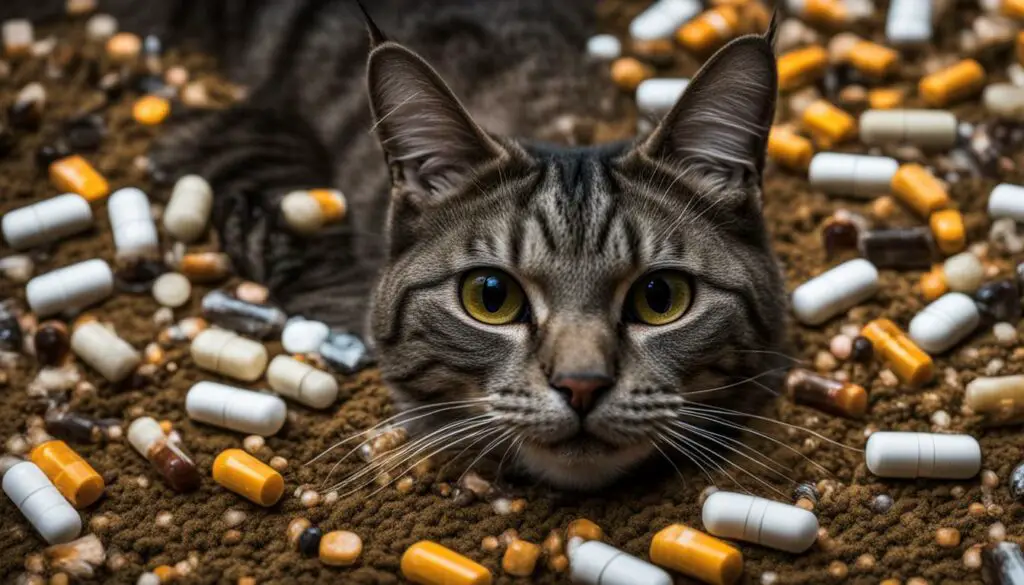
By understanding the dangers of overprescribing antibiotics and taking preventive measures, we can promote responsible antibiotic use in cats. This not only safeguards their health but also helps preserve the effectiveness of these life-saving medications for both animals and humans. If you have concerns about your cat’s medication or need guidance, always consult with your veterinarian to ensure the best possible care for your feline companion.
Addressing Underlying Issues to Reduce Antibiotic Use
When it comes to managing digestive issues in cats after medication, addressing underlying issues can play a crucial role in reducing the need for antibiotics. Frequent infections in cats may be a sign of an underlying problem that needs attention. Allergies, for example, can lead to recurring skin infections. By treating the root cause, such as allergies, we can help reduce your cat’s reliance on antibiotics and prevent overuse.
Identifying and addressing these underlying issues requires a comprehensive approach. Working closely with your veterinarian, you can determine the underlying cause of your cat’s frequent infections. This may involve allergy testing, dietary adjustments, or environmental changes to minimize exposure to triggers.
By taking a proactive approach to your cat’s health, you can help prevent future infections and reduce the need for antibiotics. Regular wellness check-ups and preventive measures, such as vaccinations and parasite control, can keep your cat’s immune system strong and minimize the risk of infections. Additionally, maintaining a clean and stress-free environment can help promote overall health and reduce the likelihood of infections and subsequent antibiotic use.
| Underlying Issue | Preventive Measures |
|---|---|
| Allergies | – Allergy testing and treatment – Dietary adjustments – Environmental modifications |
| Immunodeficiency disorders | – Regular wellness check-ups – Vaccinations – Parasite control |
| Stress | – Providing a clean and stress-free environment – Environmental enrichment – Reducing exposure to stressful stimuli |
By addressing these underlying issues, we can promote your cat’s overall well-being and reduce the reliance on antibiotics. It’s important to remember that antibiotics are a valuable tool in treating bacterial infections, but when used responsibly and in conjunction with addressing underlying issues, we can minimize the need for them and maintain a healthier feline companion.
The Importance of Completing Antibiotic Courses
When your cat is prescribed antibiotics, it is crucial to ensure that the full course of medication is completed. Stopping antibiotics prematurely can have negative consequences, including allowing the infection to return and increasing the risk of antibiotic resistance. To reduce the likelihood of your cat vomiting from antibiotics, it is important to follow your veterinarian’s instructions and complete the entire course of treatment.
Completing antibiotic courses helps to ensure that all bacteria causing the infection are eliminated, reducing the chances of a relapse. Additionally, finishing the prescribed course of antibiotics helps to prevent the development of antibiotic resistance. When bacteria are exposed to antibiotics but not completely eradicated, they may develop resistance to the medication, making future infections harder to treat. By completing the full course of antibiotics, you are actively contributing to the fight against antibiotic resistance.
If your cat accidentally misses a dose of antibiotics, it is important to consult with your veterinarian for guidance. They may recommend adjusting the dosing schedule or providing an extra dose to make up for the missed one. It is crucial to avoid doubling up on doses without veterinary guidance, as this can lead to adverse effects or complications. Your veterinarian will be able to provide the best advice for managing missed doses and ensuring the effectiveness of the treatment.
| Ways to Reduce Cat Vomiting from Antibiotics |
|---|
| Always complete the full course of antibiotics as prescribed by the veterinarian. |
| Consult with your veterinarian if your cat accidentally misses a dose. |
| Do not double up on doses without veterinary guidance. |
In summary, completing the full course of antibiotics is essential for ensuring effective treatment and reducing the risk of antibiotic resistance. By following your veterinarian’s instructions and managing missed doses appropriately, you can help keep your cat healthy and prevent future complications.
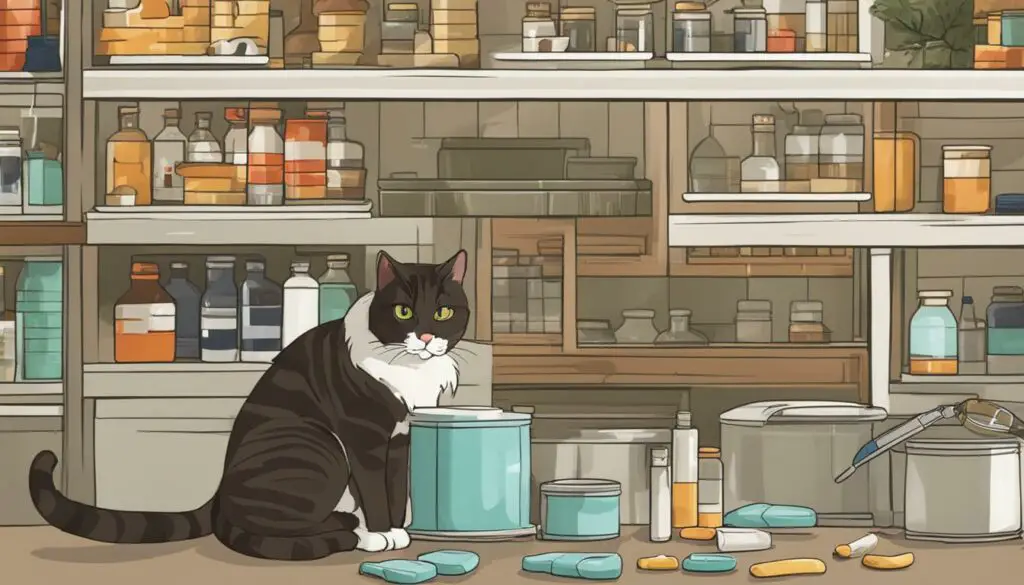
Recognizing Allergic Reactions to Antibiotics in Cats
Allergic reactions to antibiotics can occur in cats, and it is important for cat owners to be able to recognize the signs. One common symptom of an allergic reaction is vomiting, which can be distressing for both the cat and the owner. If your cat starts throwing up after taking antibiotics, it could be a sign of an allergic reaction to the medication.
Other symptoms of an allergic reaction may include diarrhea, excessive drooling, difficulty breathing, hives, or even seizures. If your cat experiences any of these severe symptoms, it is crucial to seek immediate veterinary care. Your veterinarian will be able to assess the situation and provide the necessary treatment to alleviate your cat’s discomfort.
When discussing your cat’s medication with your veterinarian, be sure to inform them of any other medications your cat may be taking. This is because drug interactions can occur, potentially causing side effects or reducing the effectiveness of the antibiotics. By being transparent about your cat’s medication regimen, you can help your veterinarian make the best decisions for your cat’s health.
Remember, every cat is unique, and reactions to antibiotics can vary. It is essential to monitor your cat closely while they are on antibiotics and report any concerning symptoms to your veterinarian. With the right care and attention, you can ensure the well-being of your cat and make their recovery process as smooth as possible.
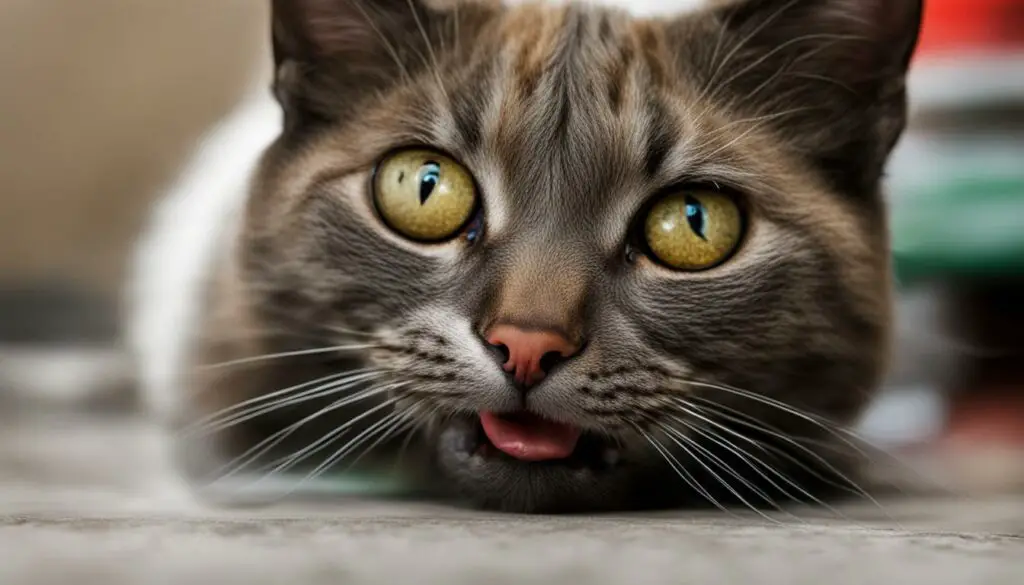
Managing Upset Stomach After Antibiotics in Cats
When a cat experiences an upset stomach after taking antibiotics, it’s important to take steps to manage their discomfort. There are several strategies you can use to alleviate their symptoms and promote their overall well-being.
1. Provide a bland diet:
Transitioning your cat to a bland diet can help soothe their upset stomach. Offer foods that are easy to digest, such as boiled chicken or fish, plain white rice, or a prescription gastrointestinal diet recommended by your veterinarian. Avoid giving them rich or fatty foods that may further aggravate their stomach.
2. Offer probiotics:
Antibiotics can disrupt the balance of beneficial bacteria in your cat’s gut, leading to digestive issues. Probiotics can help restore this balance and promote a healthy digestive system. Talk to your veterinarian about giving your cat a probiotic supplement specifically formulated for cats.
3. Monitor water intake:
Dehydration can worsen digestive issues. Ensure that your cat has access to fresh water at all times and monitor their water intake closely. If you notice signs of dehydration, such as loss of skin elasticity or dry gums, consult your veterinarian.
4. Slowly reintroduce regular diet:
Once your cat’s stomach has settled, gradually reintroduce their regular diet. Start by mixing small amounts of their normal food with the bland diet, gradually increasing the proportion of regular food over several days. This gradual transition helps prevent further digestive upset.
| Signs of Dehydration: | Healthy Hydration Tips: |
|---|---|
| – Loss of skin elasticity | – Provide fresh water at all times |
| – Dry gums | – Monitor water intake closely |
| – Lethargy | – Consider using a water fountain to encourage drinking |
| – Sunken eyes | – Offer wet food or water-rich treats |
“Managing your cat’s upset stomach after antibiotics involves providing a bland diet, offering probiotics, monitoring their water intake, and slowly reintroducing their regular diet.”
By following these tips, you can help ease your cat’s upset stomach after antibiotics and support their recovery. If their symptoms persist or worsen, it’s important to consult with your veterinarian for further guidance and evaluation.

Managing Cat’s Upset Stomach After Antibiotics
When a cat experiences an upset stomach after taking antibiotics, it can be concerning for pet owners. Fortunately, there are several strategies to help manage a cat’s upset stomach and minimize vomiting. It’s important to remember that every cat is unique, and what works for one may not work for another. It’s crucial to consult with your veterinarian for guidance tailored to your cat’s specific needs.
Feeding small, frequent meals
One effective way to manage a cat’s upset stomach is to feed them small, frequent meals throughout the day. This can help prevent an empty stomach, which can exacerbate nausea and vomiting. Consider dividing your cat’s daily food allowance into several small meals or try offering easily digestible, bland foods such as boiled chicken or plain, unseasoned baby food. It’s essential to avoid feeding your cat immediately after they have taken their antibiotic, as this can increase the likelihood of vomiting.
Hydration and electrolyte balance
Keeping your cat well-hydrated is crucial, especially if they are experiencing vomiting or diarrhea after taking antibiotics. If your cat is not drinking enough water, you can try offering them wet food or adding water to their dry food to increase their fluid intake. You can also consult your veterinarian about using oral electrolyte solutions specifically formulated for cats to help restore their electrolyte balance. Electrolyte imbalances can occur due to vomiting and diarrhea, and maintaining the right balance is important for your cat’s overall health.
Probiotics for gut health
Antibiotics can disrupt the natural balance of bacteria in a cat’s gut, which can contribute to gastrointestinal upset. Adding a probiotic supplement to your cat’s diet may help restore the healthy balance of gut bacteria. Probiotics can promote digestion and support a healthier gut, which may reduce the incidence of vomiting. However, it’s crucial to consult your veterinarian before introducing any new supplements or medications to your cat’s routine.
| Strategies for Managing Cat’s Upset Stomach After Antibiotics |
|---|
| Feed small, frequent meals |
| Ensure hydration and electrolyte balance |
| Consider probiotics for gut health |
Managing a cat’s upset stomach after antibiotics requires patience and careful observation. If your cat’s vomiting persists or worsens, it’s essential to seek veterinary attention promptly. Remember to follow your veterinarian’s instructions regarding the administration of medications and any dietary recommendations specific to your cat’s condition. By taking proactive steps and working closely with your veterinarian, you can help your cat recover and minimize the impact of antibiotic-related stomach upset.
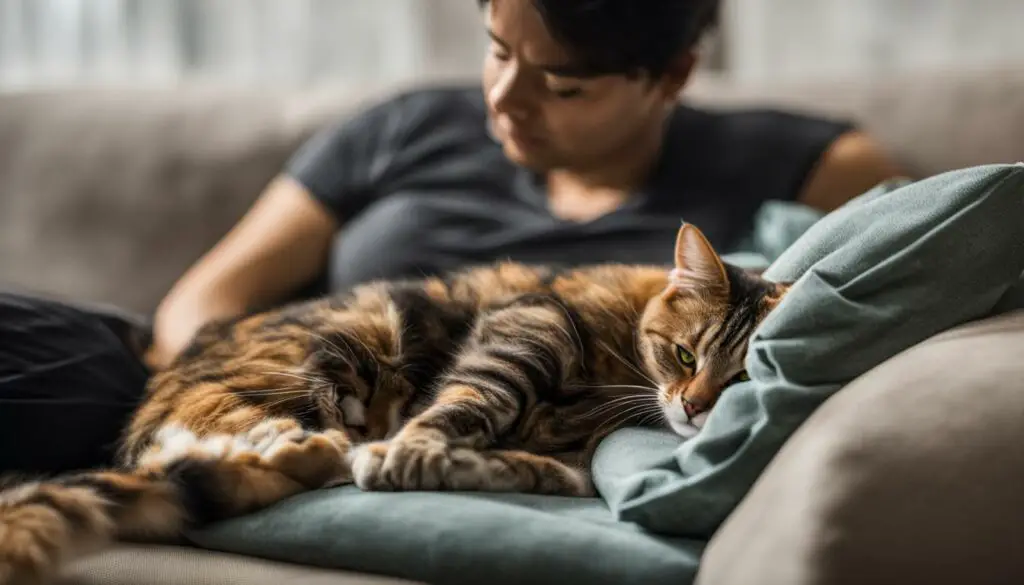
Ways to Reduce Cat Vomiting After Antibiotics
If your cat has experienced vomiting after taking antibiotics, there are several strategies you can try to help reduce these symptoms and make the medication process more comfortable for your feline friend.
1. Administer medication with food: Some cats may experience less stomach upset if the antibiotics are given with a small amount of food. Consult with your veterinarian to ensure that administering the medication with food will not affect its effectiveness.
2. Use alternative administration methods: If your cat consistently vomits after taking oral antibiotics, ask your veterinarian if there are alternative administration methods available, such as injectable or transdermal formulations. These options may be easier for your cat to tolerate.
3. Consult your veterinarian: If your cat continues to experience vomiting despite trying these strategies, it is important to reach out to your veterinarian. They can evaluate your cat’s condition and may recommend adjustments to the treatment plan or prescribe additional medications to alleviate vomiting.
| Method | Description |
|---|---|
| Administer medication with food | Give the antibiotics with a small amount of food to reduce stomach upset. |
| Use alternative administration methods | Ask your veterinarian about injectable or transdermal formulations as an alternative to oral medication. |
| Consult your veterinarian | If vomiting persists, seek guidance from your veterinarian for further evaluation and potential adjustments to the treatment plan. |
“By following these strategies, you can help make the antibiotic treatment process more comfortable for your cat and reduce the occurrence of vomiting.”
Section 11: Monitoring Severe Allergic Reactions
When it comes to your cat’s health, it’s essential to keep a close eye on any severe allergic reactions that may occur after administering antibiotics. These reactions can range from mild symptoms like vomiting to more severe signs such as difficulty breathing or weakness. If you notice any concerning symptoms, it’s crucial to reach out to your veterinarian for further evaluation.
In cases where the allergic reaction is severe, your veterinarian may recommend monitoring your cat closely and potentially keeping them overnight for observation. This allows the vet to ensure that your cat’s breathing remains stable and that they are responding well to the treatment. It’s important not to ignore these symptoms and seek immediate veterinary attention to provide the necessary care for your cat.
To summarize, monitoring severe allergic reactions is crucial in ensuring the well-being of your cat after antibiotic administration. By closely observing your cat’s symptoms and promptly involving your veterinarian, you can take appropriate measures to address any severe allergic reactions and safeguard your feline companion’s health.
Table: Signs of Severe Allergic Reactions
| Signs of Severe Allergic Reactions |
|---|
| Difficulty breathing or wheezing |
| Hives or swelling |
| Weakness or collapse |
| Seizures |
Note: This table highlights some common signs of severe allergic reactions but is not exhaustive. If you suspect your cat is experiencing an allergic reaction, it’s always best to consult with your veterinarian for proper diagnosis and treatment.
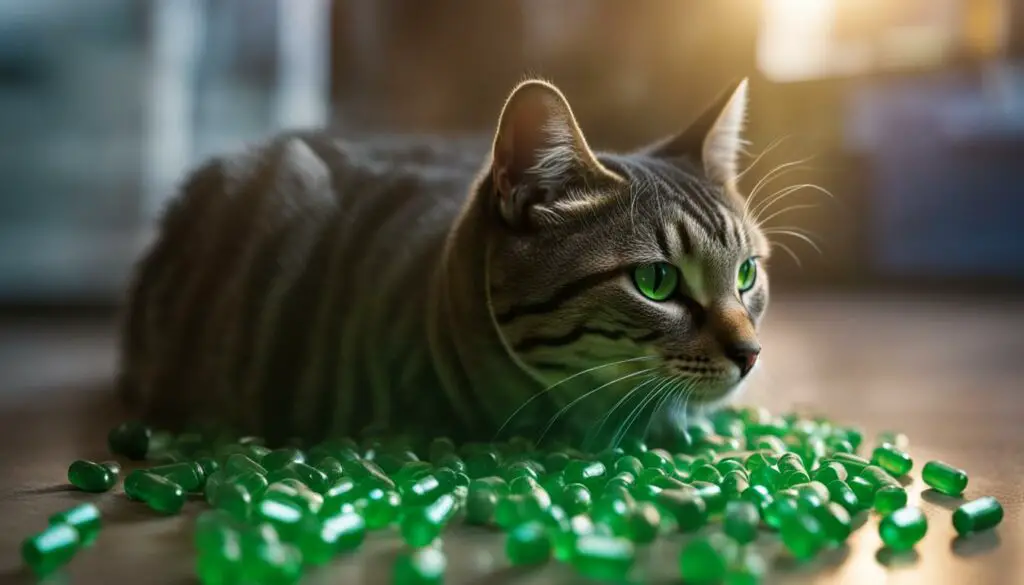
“Monitoring severe allergic reactions is crucial in ensuring the well-being of your cat after antibiotic administration.”
By staying vigilant and seeking veterinary care when necessary, you can effectively address severe allergic reactions in your cat. Remember, your veterinarian is the best resource for guidance and treatment options specific to your cat’s needs.
Communication with Your Veterinarian
When it comes to your cat’s health, open and clear communication with your veterinarian is essential. If you notice any concerning symptoms or side effects after your cat has been prescribed antibiotics, it is important to reach out to your veterinarian right away. They can provide guidance, adjust the treatment if necessary, and address any concerns you may have.
Your veterinarian is your best resource for understanding why your cat may be vomiting after taking antibiotics. They can help determine if the vomiting is a normal side effect or if there may be an underlying issue that needs further investigation. By keeping your veterinarian informed, you can work together to ensure the health and well-being of your feline companion.
It is also important to inform your veterinarian about any other medications, including prescription, over-the-counter, or herbal, that your cat is taking. Some medications can interact with antibiotics and either cause side effects or reduce the effectiveness of the treatment. By providing a complete picture of your cat’s medication history, you can help your veterinarian make informed decisions about their treatment.
Your veterinarian is there to support you and your cat throughout the treatment process. Don’t hesitate to reach out to them with any questions or concerns. They have the expertise and knowledge to guide you and ensure the best possible outcome for your furry friend.
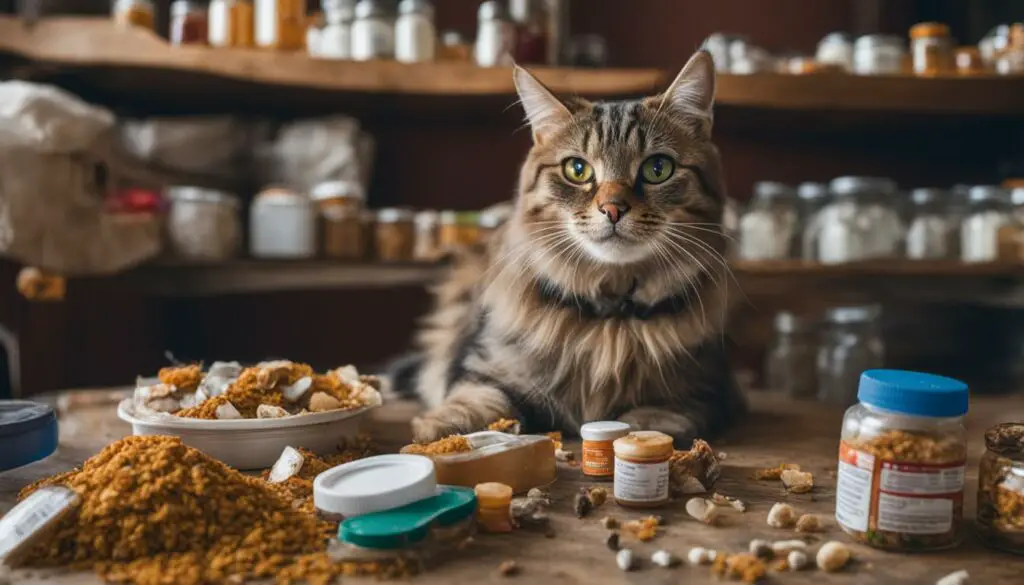
What to discuss with your veterinarian:
- Any concerning symptoms or side effects your cat is experiencing
- Complete medication history, including any other medications your cat is taking
- Any changes in your cat’s behavior or overall health
- Any questions or concerns you may have about your cat’s treatment
Remember, your veterinarian is there to help and support you. By maintaining open communication, you can ensure the best possible care for your cat.
Table: Common Side Effects of Antibiotics in Cats
| Side Effect | Description |
|---|---|
| Vomiting | Nausea and vomiting are common side effects of antibiotics in cats. If your cat is vomiting after taking antibiotics, it is important to reach out to your veterinarian. |
| Diarrhea | Antibiotics can disrupt the balance of bacteria in the gut, leading to diarrhea in some cats. If your cat has diarrhea that lasts for more than a day or is accompanied by other concerning symptoms, contact your veterinarian. |
| Loss of Appetite | Some cats may experience a decreased appetite while on antibiotics. If your cat is not eating or is refusing to take their medication, consult with your veterinarian for guidance. |
Proper Medication Administration for Cats
Giving medication to cats can sometimes be a challenge, especially when it comes to minimizing the risk of vomiting. However, there are a few strategies that can help make the process easier and more successful. One option is to administer the medication with a small amount of food. Consult with your veterinarian to determine if this method is appropriate for the medication your cat is taking. Another option is to follow your veterinarian’s instructions for proper administration, such as using a pill dispenser or wrapping the medication in a treat. Creating a positive association between medication and rewards can also make the process more pleasant for your cat.
When administering medication, it is important to handle your cat with care and ensure they are calm and relaxed. Find a quiet and comfortable space where you can safely give the medication without interruptions. Gently hold your cat and use a calm and soothing voice to reassure them. If your cat becomes agitated or resistant, take a break and try again later. It is crucial to never force medication into your cat’s mouth, as this can lead to injury or further stress.
Proper medication administration also involves adhering to the prescribed dosage and schedule. It is important to follow the instructions provided by your veterinarian and administer the medication as directed. Skipping doses or altering the prescribed dosage can result in ineffective treatment and may contribute to antibiotic resistance. If you have any concerns or questions about medication administration, it is always best to consult with your veterinarian for guidance.
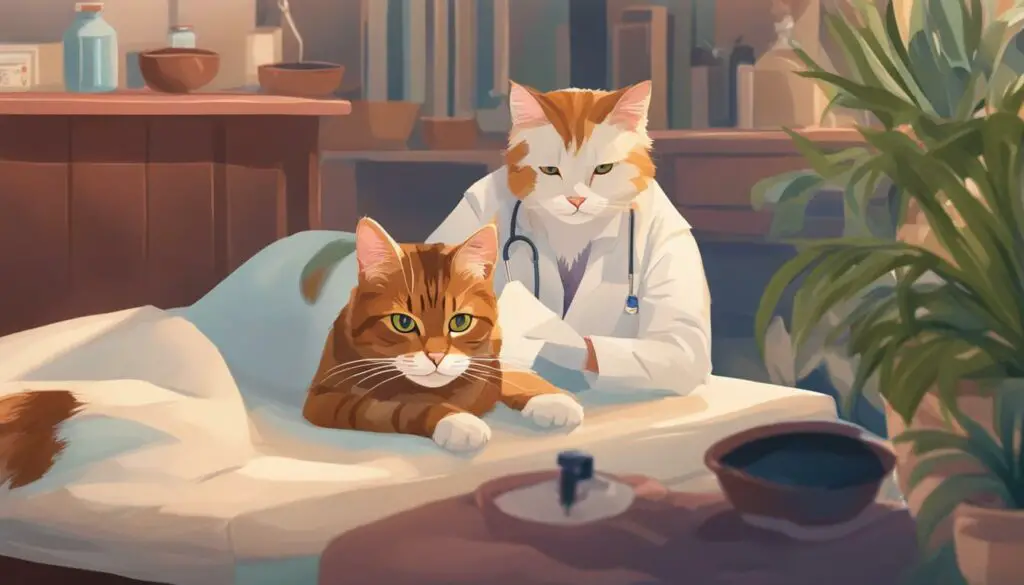
When to Seek Veterinary Care
If your cat is experiencing persistent vomiting after taking antibiotics, it is important to seek veterinary care for further evaluation. While some mild stomach upset can be normal, prolonged vomiting can indicate a more serious issue that requires medical attention. Contact your veterinarian if your cat’s condition does not improve or worsens after a few days of antibiotic treatment.
In addition to persistent vomiting, there are other symptoms that may indicate a need for veterinary care. If your cat is experiencing difficulty breathing, weakness, or any other severe symptoms, it is crucial to seek immediate veterinary attention. These symptoms could be a sign of a severe allergic reaction or another serious medical condition.
Remember, as a cat owner, it is important to trust your instincts. If you notice any concerning changes in your cat’s behavior, appetite, or overall health, do not hesitate to contact your veterinarian. They can provide guidance, conduct a thorough examination, and recommend appropriate treatment options for your cat’s specific needs.
Signs that may indicate a need for veterinary care:
- Persistent vomiting after antibiotic treatment
- Difficulty breathing
- Weakness or lethargy
- Severe allergic reactions
Your veterinarian is the best resource for determining the underlying cause of your cat’s symptoms and providing appropriate treatment. Do not delay seeking veterinary care if you have any concerns about your cat’s health.
Medication Interactions and Considerations
When administering medication to your cat, it is important to consider potential interactions with other medications they may be taking. Inform your veterinarian about any other medications your cat is on, including prescription, over-the-counter, and herbal remedies. This will help ensure the safe and effective use of antibiotics and reduce the risk of adverse reactions.
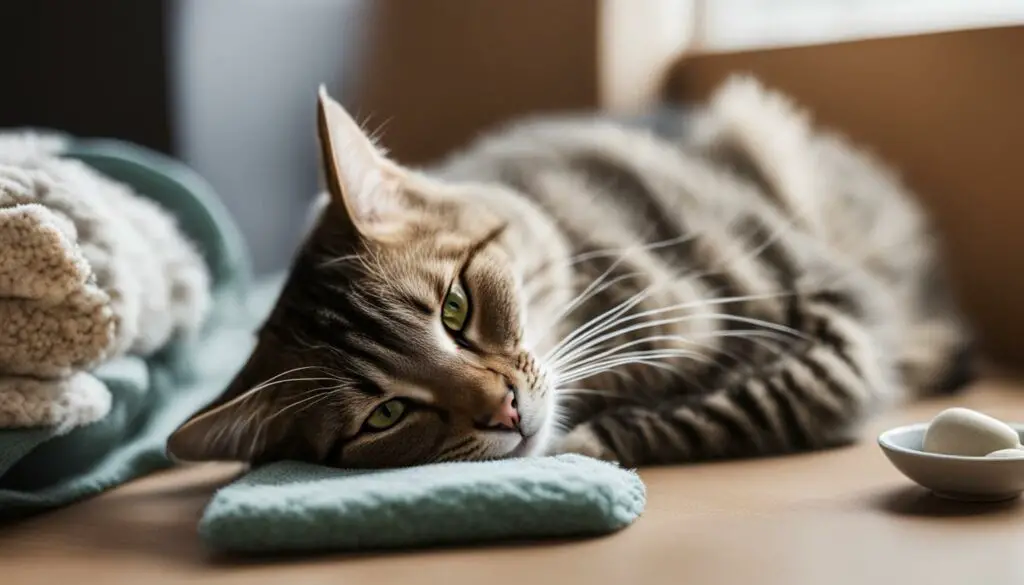
Medication interactions can occur when two or more drugs interact in a way that changes how they work or increase the risk of side effects. Antibiotics, for example, can interact with certain medications, such as non-steroidal anti-inflammatory drugs (NSAIDs) or antacids, affecting their absorption or effectiveness. By disclosing all medications to your veterinarian, they can adjust the antibiotic treatment if necessary or provide guidance on how to minimize potential interactions.
Additionally, it is crucial to follow the prescribed dosage and administration instructions for all medications. Skipping doses or administering medications incorrectly can impact their effectiveness and lead to unpredictable results. Your veterinarian can provide guidance on the proper administration technique, including hiding medication in food or using pill pockets to make it easier for your cat to swallow.
“Proper communication with your veterinarian is essential when it comes to medication interactions. By providing a detailed list of all medications your cat is taking, you can help them make informed decisions and ensure your cat’s well-being.”
Conclusion
Antibiotics can be an effective tool in treating bacterial infections in cats. When used responsibly and only for bacterial infections, they can help ensure the health and well-being of your feline companion. However, it is crucial to use antibiotics at the correct dosage and be aware of potential side effects and allergic reactions.
Understanding the importance of antibiotics and their limitations is vital. Antibiotics are specifically designed to kill bacteria, so it’s essential to confirm that your cat has a bacterial infection before administering these medications. Giving antibiotics for viral or fungal infections can lead to side effects like vomiting and may not effectively treat the underlying condition.
Consulting with your veterinarian is crucial when it comes to your cat’s medication. They will determine the appropriate dosage based on factors such as the type of infection and your cat’s weight. It is important to follow the prescribed dosage and complete the full course of antibiotics. Stopping antibiotics too soon can result in ineffective treatment and antibiotic resistance.
If your cat experiences any concerning symptoms or side effects, such as persistent vomiting or difficulty breathing, it is essential to seek immediate veterinary care. Communicating with your veterinarian about any other medications your cat is taking is also important to avoid potential drug interactions.
In conclusion, antibiotics can be a valuable tool in treating bacterial infections in cats. By using them responsibly, understanding their potential side effects, and consulting with your veterinarian, you can ensure the health and well-being of your feline companion.
FAQ
Why is my cat throwing up after taking antibiotics?
Cats can experience side effects like upset stomach and vomiting after taking antibiotics. It is important to understand why this may be happening and how to address it.
Can antibiotics cause vomiting in cats?
Yes, antibiotics can cause vomiting in cats, especially if they are given for viral or fungal infections instead of bacterial infections. It’s crucial to ensure that your cat actually has a bacterial infection before administering antibiotics.
How are antibiotic dosages determined for cats?
Veterinarians determine the dosage of antibiotics based on factors like the type of infection and the cat’s weight. It is important to follow the prescribed dosage and not share antibiotics between pets, as different animals may require different dosages.
Can overprescribing antibiotics be dangerous for cats?
Yes, overprescribing antibiotics can lead to antibiotic resistance in cats. Using antibiotics when they are not necessary or for viral or fungal infections can increase the chances of your cat developing antibiotic resistance, making future infections harder to treat.
Why does my cat keep getting infections?
Frequent infections in cats may be a sign of an underlying issue that needs to be addressed. Allergies, for example, can lead to recurring skin infections. By treating the underlying problem, such as allergies, you can reduce your cat’s reliance on antibiotics and prevent overuse.
Is it important for my cat to complete the full course of antibiotics?
Yes, cats should always complete the full course of antibiotics as prescribed by the veterinarian. Stopping antibiotics too early can allow the infection to return and increase the risk of antibiotic resistance. If your cat misses a dose, consult with your veterinarian for guidance.
What should I do if my cat has an allergic reaction to antibiotics?
If your cat experiences severe allergic reactions like difficulty breathing, hives, or seizures, seek immediate veterinary care. It is important to inform your veterinarian about any other medications your cat is taking, as drug interactions can occur.
How are allergic reactions to antibiotics treated in cats?
If your cat has an allergic reaction to antibiotics, your veterinarian may administer IV fluids to rehydrate your cat and help flush the medication out of their system. They may also prescribe antihistamines to fight the allergic reaction. In some cases, your veterinarian may need to replace the antibiotic with an alternative.
Can bathing help with skin irritation from an allergic reaction to antibiotics?
Yes, if your cat experiences skin irritation from an allergic reaction, your veterinarian may recommend bathing them with a prescribed shampoo to soothe the inflammation and provide relief. This can help calm the skin and minimize discomfort.
Should I avoid giving my cat the same antibiotic if they have had an allergic reaction before?
Once your cat has had an allergic reaction to a specific antibiotic, your veterinarian will likely advise against future use of that medication. They may prescribe an alternative treatment if necessary. It is important to follow your veterinarian’s recommendations to prevent additional allergic reactions.
What should I do if my cat experiences a severe allergic reaction to antibiotics?
If your cat experiences a severe allergic reaction, your veterinarian may recommend monitoring them closely and potentially keeping them overnight for observation. This is to ensure that their breathing is stable and that they are responding well to treatment.
What should I do if I notice concerning symptoms or side effects after my cat takes antibiotics?
If you notice any concerning symptoms or side effects after your cat has been prescribed antibiotics, it is important to reach out to your veterinarian. They can provide guidance, adjust the treatment if necessary, and address any concerns you may have.
How can I reduce the likelihood of my cat vomiting after taking medication?
Giving medication to cats can sometimes be challenging. To help reduce the likelihood of vomiting, try administering the medication with a small amount of food or follow your veterinarian’s instructions for proper administration. Providing treats or rewards after medication can also help create a positive association.
When should I seek veterinary care if my cat’s condition does not improve after antibiotics?
If your cat’s condition does not improve or worsens after a few days of antibiotic treatment, it is important to contact your veterinarian for further evaluation. Severe symptoms like difficulty breathing or weakness require immediate veterinary attention.
Should I inform my veterinarian about other medications my cat is taking?
Yes, it is important to inform your veterinarian about any other medications, including prescription, over-the-counter, or herbal, that your cat is taking. Some medications can interact with antibiotics and either cause side effects or reduce the effectiveness of the treatment.

